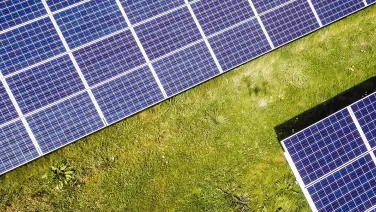Double trouble: how two friends stuck together to score their dream jobs
Good friends Rahul Ravindranathan and Aniruddha Deshpande didn’t know one another until they found themselves on the same journey from India to Canberra to study a Master of Energy Change. Now they’ve graduated from ANU, but the journey continues for both of them – with jobs in the local renewable energy sector.
Rahul: I studied electrical engineering in India, but wanted to move in the direction of policy, so I was looking for a suitable master’s degree, which is when I found out about the Master of Energy Change.
Ani: I followed in Rahul’s footsteps, you could say: I also studied electrical engineering, and worked for about one year in the field of renewables, then signed up for the Master of Energy Change.
Rahul: I asked the ANU representative in India if she knew anyone else doing my program, and she was like, ‘Yeah, there’s some guy in Pune.’ And then we got added to the same WhatsApp group, and I was excited to find Ani there.
Ani: It was meant to be.
Rahul: We were living about 1,500 kilometres apart in India, so we couldn’t catch up in person but we were in communication for a month on WhatsApp talking about what we were taking with us, what flights we were catching, and that kind of thing. Then we both arrived in Canberra two days apart, and because Ani had his accommodation sorted right away, his place became a place for us to hang out and plan what courses to take. I remember you were feeling homesick initially, Ani.
Ani: It was the first time I had lived away from my family home, and O-Week was one week away so there was no one around except us.
Rahul: For me, homesickness was not a problem because I have been a nomad my entire life. The biggest challenge for me was the quietness. I lived in Delhi, which has the population of Australia, and then I came to Canberra, and I thought, ‘Where are the people?’ The culture shock, the food, the lingo, they were the most difficult parts for me. So in O-Week we were just crazily signing up for everything, running around, doing everything.
Ani: Oh yeah, we ran around everywhere.
Rahul: There was a big flock of us, who had just arrived. I actually saw that same scene happening again back in February this year - a big group of students who had obviously just arrived in the country, trying to figure out stuff. I was like, ‘That was me four years ago!’ It’s a natural part of the journey. You have to put yourself out there, and we did.
Ani: We even lined up for an engineering barbecue because they were giving away free t-shirts, and we weren’t even engineering students.
Rahul: When we started classes, that was another overwhelming thing. Back in India, the university system is a bit more rigid, and the way you present yourself is more important. I remember here in class, week one, I was looking around trying to figure out if the professor was in the classroom, but I couldn’t see him.
Ani: He was in shorts! We thought he was a student.
Rahul: And then he introduced himself and I thought, ‘Wow, I am in the right place.’
Ani: But we loved the relaxed nature of the teaching.
Rahul: Yes, there is two-way communication. I think it took us a few weeks to gauge how we needed to operate, because we had come from the different mindset in India. We needed to open up and change ourselves.
Ani: My advice to anyone coming here is to look out for opportunities from the very beginning when you arrive, because there is a focus on networking in Canberra. My current job I got through LinkedIn, by discussing my interest in working in this field with the Manager. I started as an intern and then I got a fulltime job.
Rahul: We came here with the idea of getting a job here, and now I am a Program Officer in Climate Change and Energy Division with the Environment, Planning and Sustainable Development Directorate of the ACT Government. This is exactly the kind of job I wanted to get. I’m working with a program called the Sustainable Households Scheme, we give interest free loans to ACT households to make them more energy efficient. I do the data assessment, the monitoring and evaluation, and even assess new energy efficient products which can be included under the scheme.
Ani: I am a Project Manager at Neoen, an independent renewables company in the private sector. I am making sure Rahul’s team get the electricity they need to do their job! Currently I’m working on the development of a wind project and a battery project, managing everything from talking to landholders, to talking to the connections team, and then working out all the technical studies required to construct the project, talking to the consultants, talking to the government and traditional land owners.
Rahul: It wasn’t always easy, especially during COVID, but we encouraged each other and showed each other there are opportunities. And now I’m happy to stay in Canberra forever. It took me a month to get used to it, and after that, I thought, ‘This is bliss. This is what I’ve been missing in my life.’
Ani: Yes, me too. And I’m proud too, to be working in energy security, and of us doing exactly the kind of jobs we wanted to do.
Get the job you want with a Master of Energy Change from ANU.




